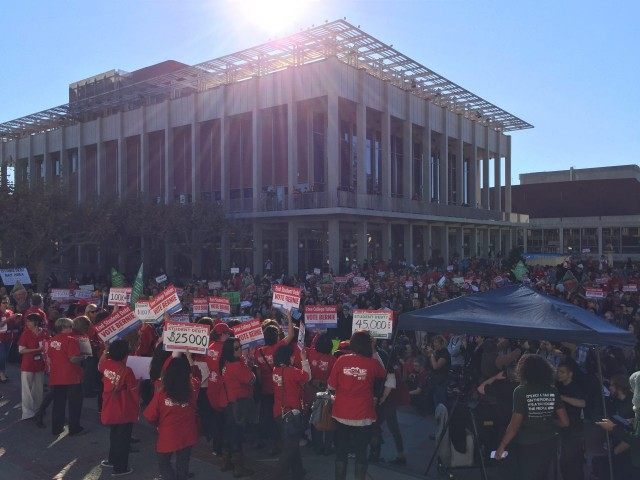Union workers rallied on the campus of the University of California Berkeley Thursday in opposition to the first layoff notice given to a clerical employee as part of a planned series of hundreds of layoffs aimed at erasing a $150 million debt the school has incurred.
The layoffs announcement came shortly after California passed a minimum wage hike. In the past, left-wing student activists at UC Berkeley have joined unions in pushing for higher wages, including a “living wage,” for campus staff.
Campus minimum wages had lagged behind state and local wages because the university, as a public state institution, is exempt from local minimums. However, the University of California voted in 2015 to join California in raising its minimum wage to $15 over three years — and to do so several years ahead of the state, whose $15 minimum wage takes full effect in 2022.
“This is a really shabby way of treating your staff,” Janette Reid, who has worked for three decades on the campus and was the first person to receive a layoff notice, said to the East Bay Times. “Getting rid of me is not going to do much of anything for the bottom line,” Reid, who was planning her retirement in June of 2017, added. She reportedly worked mostly as an administrative assistant in the Department of Molecular & Cell Biology.
UC Berkeley chancellor Nicholas Dirks announced last month that the educational institution will be eliminating 500 jobs over the course of two years, which will wind up saving an estimated $50 million, which he believes will offset the remaining $100 million deficit the school will need to cover in other ways.
Many opposed to the layoffs have suggested administration leaders should suffer the layoffs, not workers or students.
Dirks reportedly announced this week that he would also be dissolving the Office of Strategic Initiatives, which was created in February to coordinate campus-wide reorganization, notes the East Bay Times.
On the Office of Strategic Initiatives’ Frequently Asked Questions segment, a response is provided to the question about Berkeley’s financial position, and how the school arrived there:
Over the past several years, Berkeley has deliberatively managed a budget deficit, which in FY2015-16 is projected to reach about $150 million, or about six percent of our operating budget. We have done so to invest in our academic excellence, expand financial aid programs, and fund badly needed systems upgrades. This deficit has grown over time for several reasons and will continue to do so until we take action. The primary factors driving our deficit are both familiar and long-standing: Our revenues have been significantly constrained, while our costs have significantly increased.
Photo: File
Follow Adelle Nazarian on Twitter @AdelleNaz

COMMENTS
Please let us know if you're having issues with commenting.